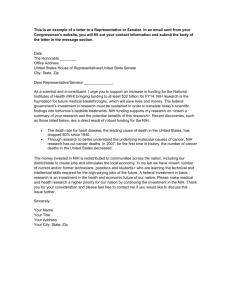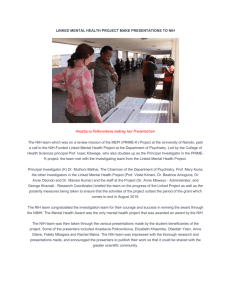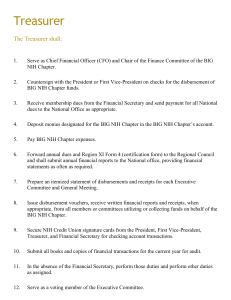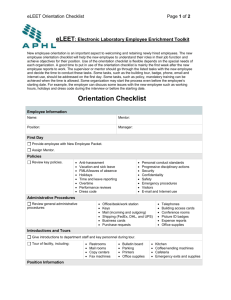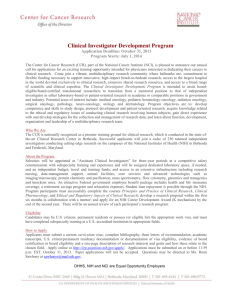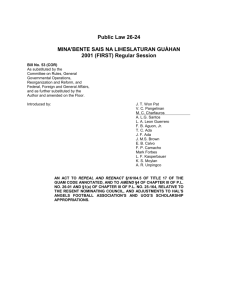Open ended questions and cover letter
advertisement
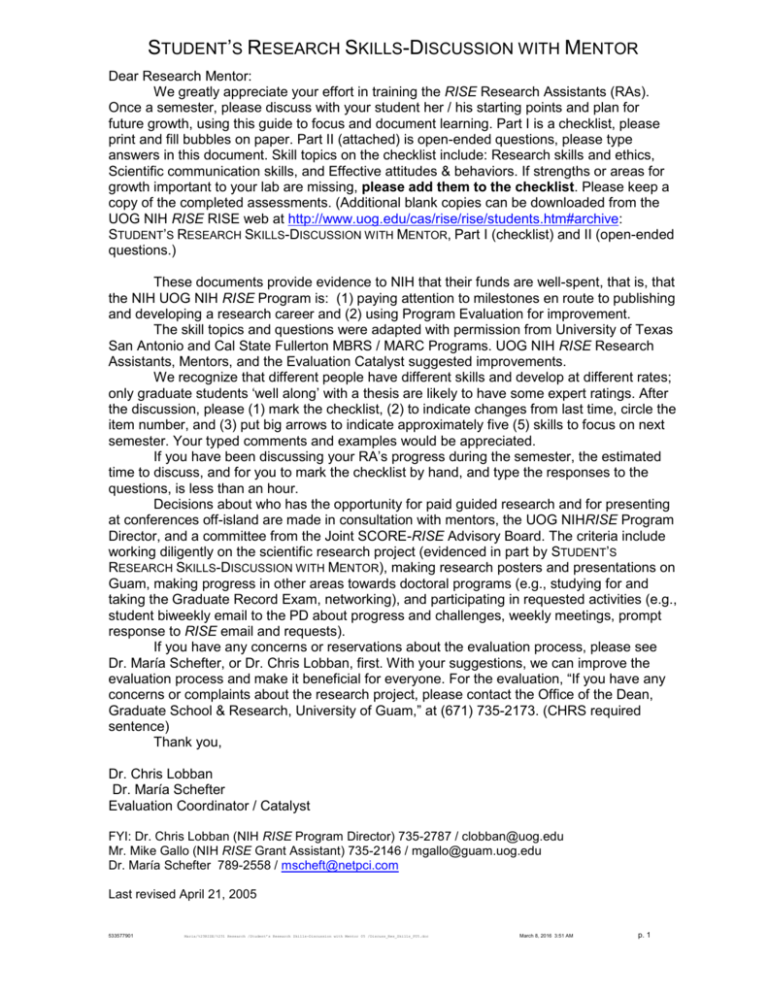
STUDENT’S RESEARCH SKILLS-DISCUSSION WITH MENTOR Dear Research Mentor: We greatly appreciate your effort in training the RISE Research Assistants (RAs). Once a semester, please discuss with your student her / his starting points and plan for future growth, using this guide to focus and document learning. Part I is a checklist, please print and fill bubbles on paper. Part II (attached) is open-ended questions, please type answers in this document. Skill topics on the checklist include: Research skills and ethics, Scientific communication skills, and Effective attitudes & behaviors. If strengths or areas for growth important to your lab are missing, please add them to the checklist. Please keep a copy of the completed assessments. (Additional blank copies can be downloaded from the UOG NIH RISE RISE web at http://www.uog.edu/cas/rise/rise/students.htm#archive: STUDENT’S RESEARCH SKILLS-DISCUSSION WITH MENTOR, Part I (checklist) and II (open-ended questions.) These documents provide evidence to NIH that their funds are well-spent, that is, that the NIH UOG NIH RISE Program is: (1) paying attention to milestones en route to publishing and developing a research career and (2) using Program Evaluation for improvement. The skill topics and questions were adapted with permission from University of Texas San Antonio and Cal State Fullerton MBRS / MARC Programs. UOG NIH RISE Research Assistants, Mentors, and the Evaluation Catalyst suggested improvements. We recognize that different people have different skills and develop at different rates; only graduate students ‘well along’ with a thesis are likely to have some expert ratings. After the discussion, please (1) mark the checklist, (2) to indicate changes from last time, circle the item number, and (3) put big arrows to indicate approximately five (5) skills to focus on next semester. Your typed comments and examples would be appreciated. If you have been discussing your RA’s progress during the semester, the estimated time to discuss, and for you to mark the checklist by hand, and type the responses to the questions, is less than an hour. Decisions about who has the opportunity for paid guided research and for presenting at conferences off-island are made in consultation with mentors, the UOG NIHRISE Program Director, and a committee from the Joint SCORE-RISE Advisory Board. The criteria include working diligently on the scientific research project (evidenced in part by STUDENT’S RESEARCH SKILLS-DISCUSSION WITH MENTOR), making research posters and presentations on Guam, making progress in other areas towards doctoral programs (e.g., studying for and taking the Graduate Record Exam, networking), and participating in requested activities (e.g., student biweekly email to the PD about progress and challenges, weekly meetings, prompt response to RISE email and requests). If you have any concerns or reservations about the evaluation process, please see Dr. María Schefter, or Dr. Chris Lobban, first. With your suggestions, we can improve the evaluation process and make it beneficial for everyone. For the evaluation, “If you have any concerns or complaints about the research project, please contact the Office of the Dean, Graduate School & Research, University of Guam,” at (671) 735-2173. (CHRS required sentence) Thank you, Dr. Chris Lobban Dr. María Schefter Evaluation Coordinator / Catalyst FYI: Dr. Chris Lobban (NIH RISE Program Director) 735-2787 / clobban@uog.edu Mr. Mike Gallo (NIH RISE Grant Assistant) 735-2146 / mgallo@guam.uog.edu Dr. María Schefter 789-2558 / mscheft@netpci.com Last revised April 21, 2005 533577901 Maria/%23RISE/%231 Research /Student’s Research Skills-Discussion with Mentor 05 /Discuss_Res_Skills_F05.doc March 8, 2016 3:51 AM p. 1 STUDENT’S RESEARCH SKILLS-DISCUSSION WITH MENTOR, Part II [Part I is the paper checklist] For questions 1 - 5 on this page, responses filled in by the Program may be boldfaced (corrections and additions will be appreciated): 1. When did this student begin working with you? 2. University standing (according to credits): (a) Freshman (b) Sophomore (c) Junior (d) Senior (e) Graduate 3. University standing (according to major program : (a) Freshman (b) Sophomore (c) Junior (d) Senior (e) graduate student 4. Major (a) Biology (b) Chemistry (c) Psych (d) Other _______ Minor ___________ 5. Expected graduation date Degree B.A. M.S. For more examples of skills for students to assess strengths & weaknesses and evidence of needs, see (1) COMPREHENSIVE STUDENT SURVEY 5/8/01 and summaries of baseline data on science student skills: www.uog.edu/cas/rise/feedbk/questions.htm. (2) Wan, Julia C. and Koch, Robert A. (2/12/2002). Student Assessment Undergraduate Research Scholars Programs Cal State Fullerton. Cal State Fullerton MARC U*STAR Program. 533577901 Maria/%23RISE/%231 Research /Student’s Research Skills-Discussion with Mentor 05 /Discuss_Res_Skills_F05.doc March 8, 2016 3:51 AM p. 2 Use as much space as needed for the following questions: A. Overall, how satisfied are you with [student name] as of [ date]? B. Do you expect this student will have a research design (including hypothesis) and possibly data for a presentation at the CLASS Research Conference in mid March? C. When do you expect this undergraduate student will have enough data to present off-island at a student conference, e.g., SACNAS or ABRCMS (abstracts due in July / Aug.)? D. When do you expect this student will have enough data analyzed to present at a conference in your discipline? [UOG NIH RISE could fund your student] Which conference? & When is it? E. Is the research question that the student is working on mostly your idea or hers? F. Additional comments on student’s research work, including significant improvement during the semester, and the likelihood of Ph.D. research -- G. What factors do you see as important in having an effective collaborative relationship with this NIH RISE student? (Factors that may be working or lacking & what solutions do you suggest?) H. What type of mentoring activities have you participated in with the student? (e.g. What have you done about: discussing importance of grades, decisions regarding graduate school, interest, motivation, development of research skills and ethics, scientific communication skills, effective attitudes & behaviors, and student’s research hypothesis?) I. About how many minutes did it take to respond to Part I and II? The UOG NIH RISE Program thanks you for your time and effort. Please keep electronic and a paper copies for your files and return original [by date] if possible to: Dr. María Schefter (NIH RISE Evaluation) 789-2558 / mscheft@netpci.com; Or call Mr. Mike Gallo at 735-2146 or María to arrange for pickup 533577901 Maria/%23RISE/%231 Research /Student’s Research Skills-Discussion with Mentor 05 /Discuss_Res_Skills_F05.doc March 8, 2016 3:51 AM p. 3

